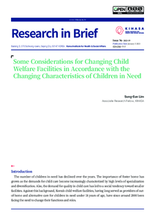Displaying 151 - 160 of 919
With millions of children worldwide living in alternative care settings, this article applies the learning from implementation science to advance the sector’s thinking around what needs to be in place to ensure consistently high-quality residential care.
This policy brief presents a list of recommendations for U.S. policymakers to transform the child welfare system by prioritizing maltreatment prevention, racial equity, and child and family well-being.
During this webinar, hosted by UNICEF and Better Care Network, Gillian Huebner presented the paper It’s time for care: Prioritizing quality care for children during the COVID-19 pandemic - Challenges, opportunities and an agenda for action. The presentation was followed by a panel discussion featuring panelists from UNICEF Child Protection, Women in Informal Employment: Globalizing and Organizing (WIEGO), UNICEF Office of Research – Innocenti, and the Early Childhood Development Action Network (ECDAN).
This paper will address one of the most challenging problems in development work which is commonly referred to as the ‘silo mentality’. In this case, this mentality affects how services for typical children are planned and implemented without including the needs of children with disabilities from the first planning step. Strategies are proposed that can help to bridge this gap.
UNICEF Bulgaria's project, "Family for Every Child," aimed to demonstrate that viable alternatives to institutionalization exist, and that as long as a network of suitable support services is in place, deinstitutionalization is achievable. UNICEF Bulgaria commissioned this evaluation to establish whether the project had been successful
This brief discusses ways in which the roles and functions of Korea’s child welfare facilities should change to better meet the diverse needs of children in need.
This guidance is designed to strengthen the capacity of government agencies in low resource settings to prepare a sound budgetary framework for policies, programs and services that aim to keep children in safe and nurturing family environments.
This one-page technical brief accompanies a Guidance Note on public expenditure and children's care. It describes how to include government strategy to promote the better care of children in the public budget.
Using a qualitative design, the author of this study interviewed 12 social workers to explore the benefits of family support services and challenges that inhibit the gains from the services.
This document serves as a guiding framework for those involved in the development of comprehensive national Care Systems as a pillar of social protection in Latin American and the Caribbean. The authors believe that these systems should be designed from a human rights perspective, with particular emphasis on mainstreaming the gender perspective to achieve care models co-responsible between the State, the market, the community, and families, and between men and women.







